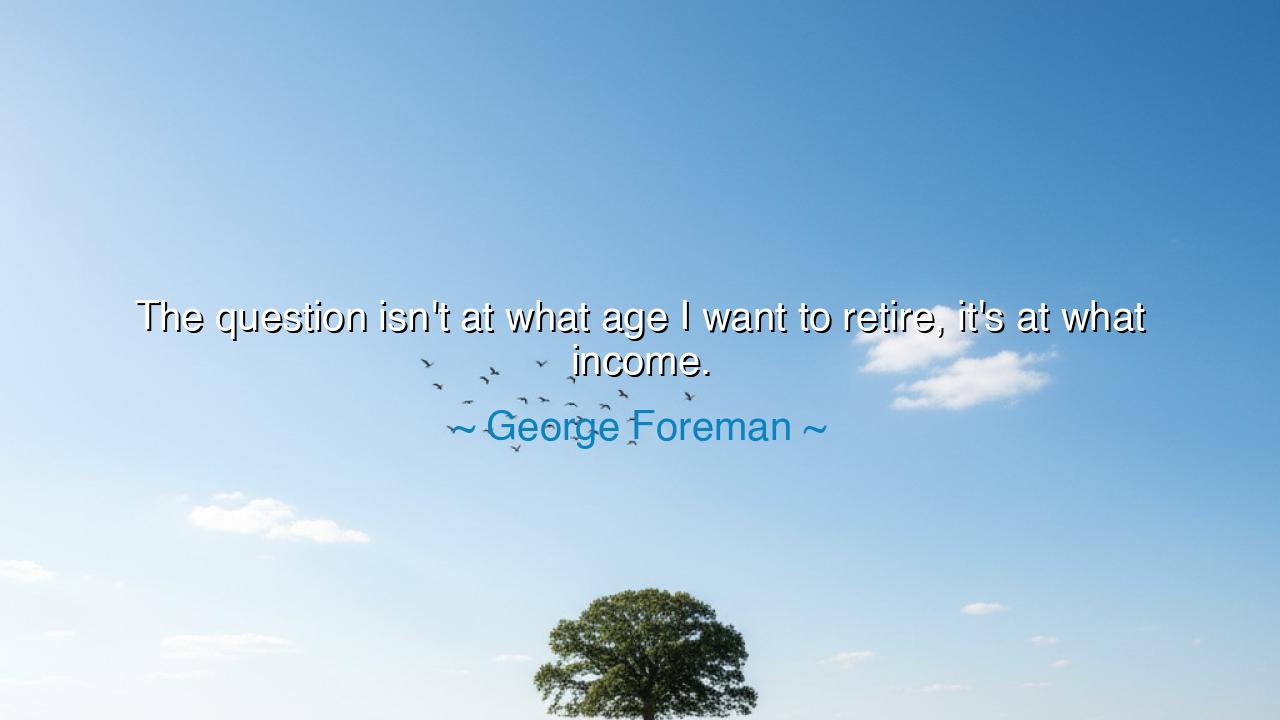
The question isn't at what age I want to retire, it's at what






"The question isn't at what age I want to retire, it's at what income." — George Foreman
In this stirring declaration, George Foreman speaks to the heart of a question that transcends the surface of retirement and delves deep into the essence of financial freedom. For too long, the conventional notion of retirement has been tied to the age at which one ceases their labors, a day when one no longer contributes to the workforce but lives on the fruits of their past. Yet, Foreman’s words suggest that true freedom comes not with the turning of a certain number of years but with the establishment of a steady, sufficient income—one that allows a person to live without the anxiety of financial constraints. This view reveals a profound truth: wealth and security are not confined to the passage of time but are rooted in the foundation one builds in their working years.
In ancient societies, the notion of work and retirement was far less structured than it is in the modern world. The Greeks, for example, viewed labor as a noble pursuit, a lifelong endeavor to achieve virtue and contribute to the well-being of society. Yet, they also recognized that a wise man, having labored faithfully, must find moments of peace in his later years. This is the essence of what Foreman suggests—not that one should stop working, but that one should work in such a way that the results of one's labor can provide freedom and peace of mind long before old age forces the body to rest.
Consider the life of Marcus Aurelius, the Roman emperor and philosopher. Though he was devoted to the duties of his office, he often reflected on the nature of wealth and the pursuit of inner peace. Marcus believed that one’s true wealth did not lie in gold or land but in virtue, wisdom, and the ability to live a balanced life. Yet, he was also aware of the practicalities of life and the need to ensure that his actions were sustainable, not only for himself but for those who would come after him. This lesson mirrors Foreman’s: financial security enables the freedom to live according to one's principles, to focus not on survival, but on the deeper matters of life.
The modern age has complicated this pursuit. Today, we measure success and freedom by the accumulation of wealth and the expectation of eventual retirement. But how many find themselves, even after a lifetime of work, without the security needed to truly enjoy their later years? The story of Warren Buffett, the legendary investor, offers a modern parallel to this principle. Buffett, through his meticulous attention to wealth-building and the value of strategic investment, secured not just a retirement but a lasting legacy. His wealth allows him to work on his own terms, to continue contributing to society, and to shape his own future in ways most could only dream of. For Buffett, the question was never "when" to retire, but "how" to ensure that his efforts bore fruit for years to come.
In every era, there are those who achieve what Foreman articulates: financial independence that frees them from the fear of poverty, from the necessity of labor for mere survival. Benjamin Franklin, one of the most notable figures in early American history, spent much of his life working not just for immediate gain, but to ensure his future. His investments in education, his intellectual pursuits, and his methodical approach to financial stability provided him with the means to retire early and continue contributing to society long after his formal work had ceased. Franklin’s wisdom lies in understanding that retirement should not be the cessation of effort but the culmination of a well-constructed life.
What, then, is the lesson we should take from Foreman and these great figures of history? The question is not when we can stop working, but how we can ensure that our labors—whether in business, in the arts, in service, or in any other endeavor—yield a sufficient income that grants us freedom and peace of mind. True security comes not from the turning of time, but from our preparedness, from our ability to cultivate wealth not for the sake of excess, but for the sake of freedom.
Thus, let us turn our focus to building the resources we need to live without fear of poverty, to continue pursuing the things that matter most to us, and to secure the future not just for ourselves but for those who come after. Whether through smart investments, savings, or the pursuit of a craft or skill that can generate lasting value, we must approach life not as a series of ticking clocks, but as a vast field of opportunity. In doing so, we will find that the question of retirement becomes irrelevant, for we will have crafted a life that is free, fulfilling, and rich in meaning, regardless of age.






AAdministratorAdministrator
Welcome, honored guests. Please leave a comment, we will respond soon